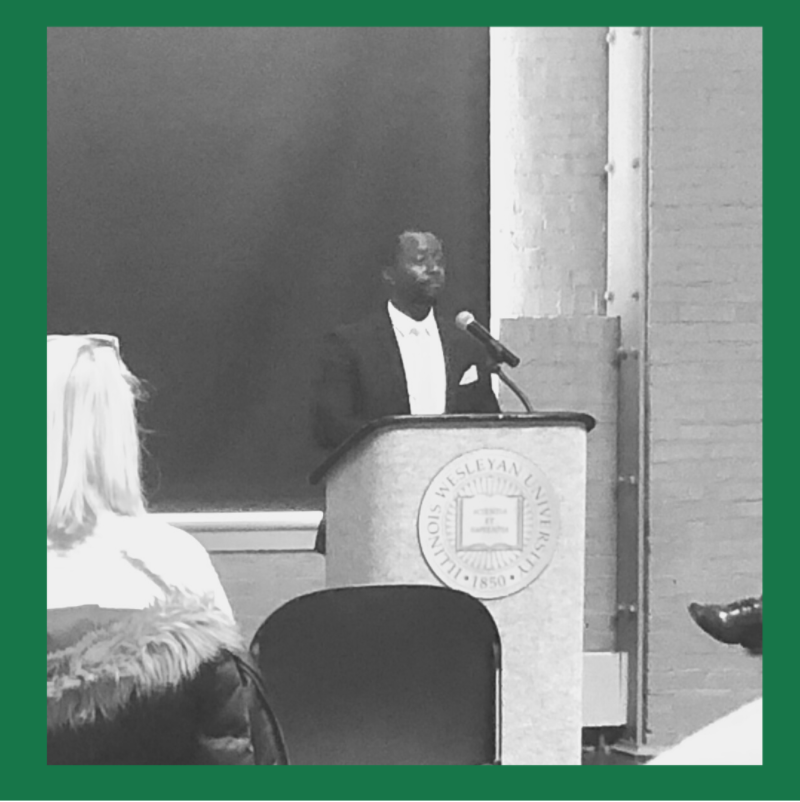
Following Students listened in on Dr. Timothy E. Lewis’s lecture called “Exposing the Truth of the American Lie: From MLK to CRT” at IWU’s “MLK Teach-In” on Wednesday, January 19. Lewis’s presentation followed up Chris Schumacher’s keynote “My World in Black and White” on Monday.
Lewis is an Assistant Professor of Political Science at Southern Illinois University-Edwardsville. He specializes in the politics of marginalized and disadvantaged identities. He is also a diversity, inclusion, equity, and social justice (DIESJ) trainer and coordinator. His philosophy is that DIESJ’s are not areas of work but rather they should be value-based approaches to all work.
“I am honored to be here, to teach you, to challenge you, to make you uncomfortable, and to call you into action” Lewis boldly began his speech.
“Dr. Lewis’s expertise was clearly on display as he guided us on a journey that connected the reactionaries of the Civil Rights Era of Rev. Dr. Martin Luther King, Jr., to the current efforts of local and national politicians to restrict and censor Critical Race Theory,” Kyle Griffith, Director of Residential Life, said.
“How many quotes of Dr. King do you know without doing some google search? How many books of his have you read? How many of his sermons have you listened to?” Lewis asked. Lewis also told the audience that they ought to know more about Dr. King than they already do.
Students, staff and faculty in attendance agreed that Lewis’s lecture was topical. In the summer of 2020, Instagram was filled with black squares that were supposed to signal that the person who posted the square believed black lives matter. The trend was met with immediate pushback from Black Lives Matter activists who called the action performative, but the squares prompted an ongoing trend of posting graphics on social media about various social movements which many have also called performative.
“The tone Dr. Lewis set with performative actions on social media being often one of the few connections we have to Dr. Martin Luther King Jr. was, unfortunately, spot on,” attendee Hannah Horn said.
Horn also said that her interactions with MLK, and racial movements in general, in education have been few and far between.
“If not for a sociology course on social movements that looked specifically on Dr. Martin Luther King Jr. ‘s work with the Montgomery Bus Boycotts and Freedom Riders, I wouldn’t have known much about Dr. King and his work beyond the “I have a dream” speech,” Horn said.
Other attendees commended Lewis’s diversity in the activists he mentioned. Lewis informed the audience of activist Jo Ann Robinson and her influence on MLK.
“I appreciated him including Jo Ann Robinson’s work in organizing the Montgomery Bus boycott and that she was the one who suggested Martin Luther King as its leader and how she rightfully pointed out, “he can move people with his words”’ Professor Carolyn Nadeau said.
Lewis urged the audience to ask themselves, if Dr. King had not been assassinated for loving a country that hated him, what would our view of Dr. King be if he were alive today?
Lewis said that believed that Dr. King was radical, even by today’s standards. He said that most moderate white people that didn’t support him back then, would not like, nor support him today.
“If you look at the Black Lives Matter protests and the calls for criminal justice reform, addressing issues of systemic inequality is rarely met with tangible actions, policies, or laws, complacency and performative actions aren’t going to enact change and Dr. Lewis honestly addressed that,” Horn said.
Dr. King exposed the truth of America, Lewis argued , and that truth is that “America is built on racial lies.”
“Dr. Lewis’ talk challenged me to confront lies that continue to be perpetuated in our society about racial progress.” Nadeau said. “
According to Nadeau, an important moment for her was when Lewis made references to today’s racial disparities in health care during the COVID-19 pandemic or that the most recently appointed Supreme Court Judge, Amy Coney Barrett, wrote a legal opinion about supervisor’s use of the “N” word.
Barrett said that there was not sufficient evidence to support a claim of a hostile work environment which Nadeau said was a oignant reminder of how much work needs to be done in our society both at the individual level and the systemic level.”
Lewis also elaborated on the 13th Amendment and the Justice system.
“The elaboration on the 13th amendment and its relationship to the criminal justice system at large is something that is rarely, if ever addressed.”Horn said .
Lewis began his lecture saying that Martin Luther King was a magnificent orator, and many audience members made it clear that there was no doubt that Lewis was as well.
“I think Dr. Lewis did a great job at telling the truth without sugar-coating the current realities around racism in America to make them more manageable for an audience to hear. He spoke the truth and backed it up by pointing out fundamental issues within our current political/governmental system.” Horn said.
“I look forward to the efforts of staff, students and faculty toward a more racially just campus that will be catalyzed after Dr. Lewis’s keynote,” Griffith said.

